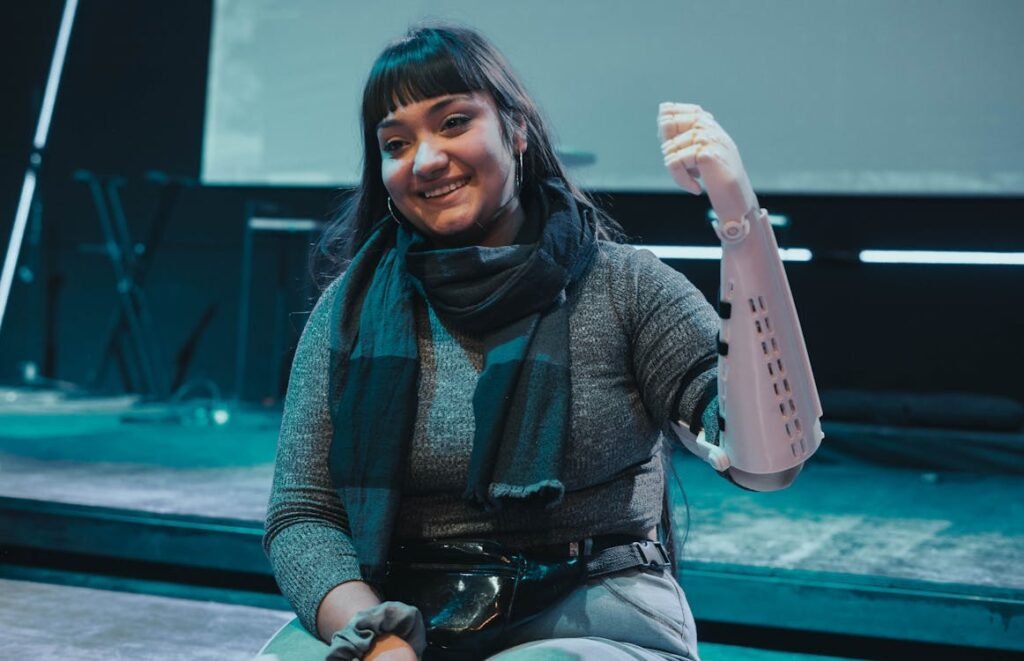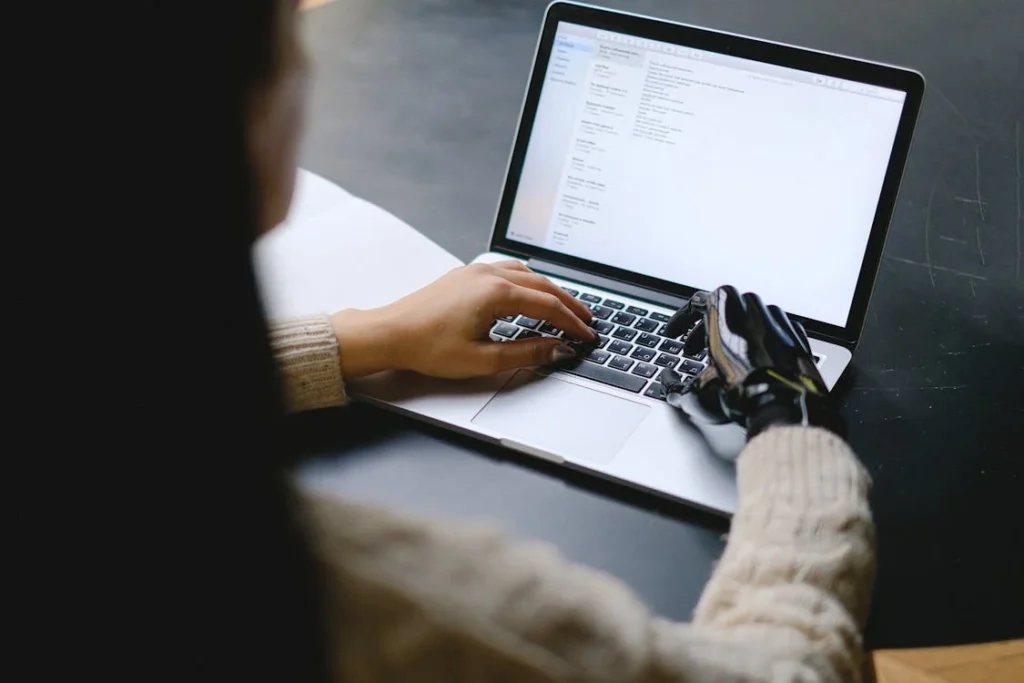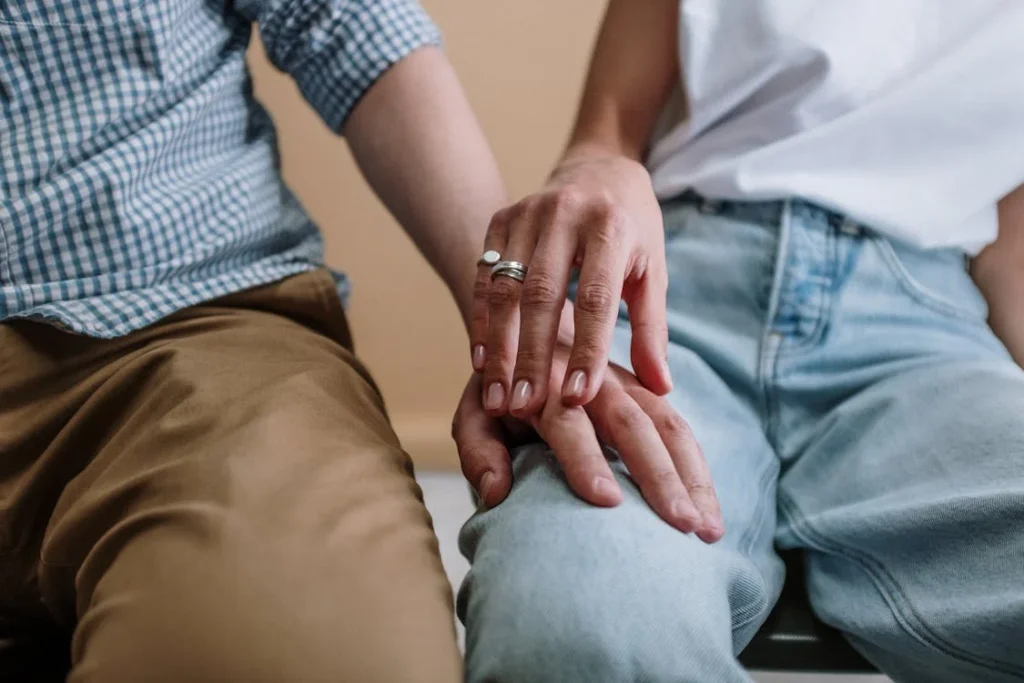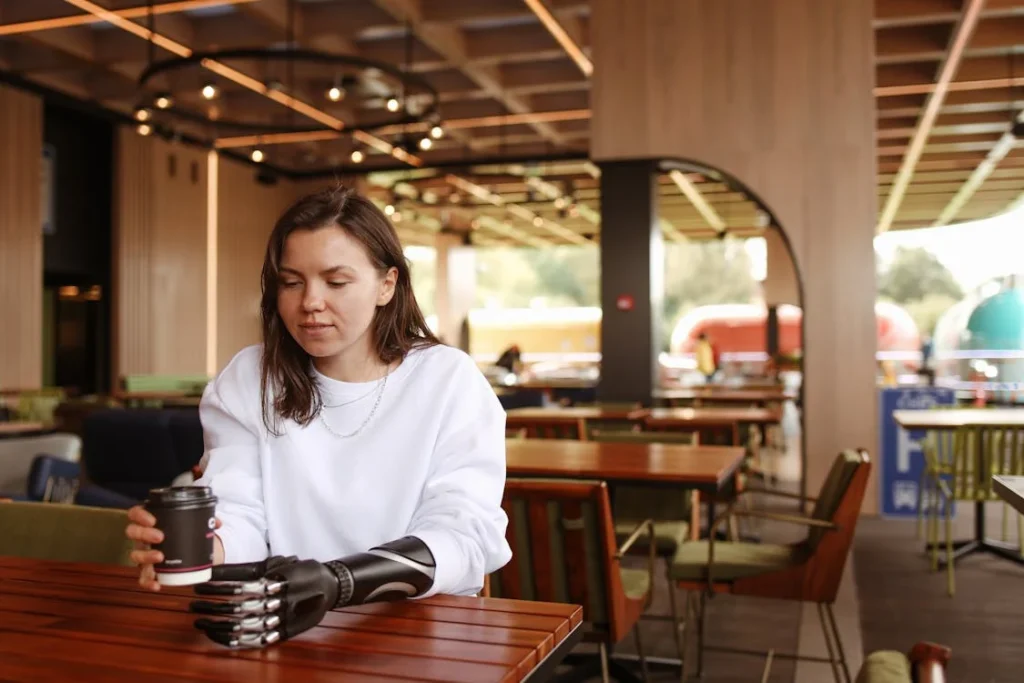Life is full of little moments that ask for the right grip—a firm hold on a knife while chopping vegetables, a steady grasp of a wet glass in the sink, or a confident grip on tools at work. For someone with a limb difference, these everyday tasks can feel risky or even impossible. But they don’t have to be.
At RoboBionics, we believe that everyone deserves to feel safe and capable in every space—whether it’s the kitchen, their home, or the workplace. That’s why we built Grippy™ with more than just movement in mind. We designed it to protect, support, and empower.

Kitchen Safety Starts with the Right Grip
Why the Kitchen Can Be a Dangerous Place
For many, the kitchen is the heart of the home. It’s where meals are made, families gather, and memories are shared. But for someone with a limb difference, the kitchen can also be one of the most challenging—and risky—places in the house. From hot pans and sharp knives to slippery vegetables and fragile glassware, almost every task demands good grip control.
Even something as simple as opening a jar or holding a spoon becomes tricky if the hand can’t hold with the right force. Too loose, and items slip. Too tight, and something might crack or spill. These aren’t just small inconveniences—they can lead to real accidents and injuries.
That’s why a bionic hand with intelligent grip technology matters. It turns the kitchen from a zone of worry into a place of independence.
Precision and Pressure That Protect
With Grippy™, our bionic hand at RoboBionics, we’ve focused on something crucial—giving users the ability to not only hold things, but to hold them just right. Through our patented Sense of Touch™ technology, the hand learns to apply the correct pressure based on the object and the task.
When you pick up an egg, Grippy™ knows not to squeeze too hard. When you hold a heavy pan, it boosts grip strength so you don’t drop it. And because it responds in real time to muscle signals, it reacts instantly to your intent—making every action smoother, safer, and more natural.
Many of our users tell us how, for the first time in years, they feel confident enough to cook alone. They can cut vegetables without fear of the knife slipping. They can wash dishes without dropping them. They can stir hot liquids without worrying the spoon will twist out of their grip. That’s more than a feature—it’s a return to freedom.
Preventing Common Accidents with Smart Feedback
One big reason accidents happen in the kitchen is lack of feedback. When you can’t feel what you’re holding, it’s hard to tell how tight your grip is or if the object is slipping. That delay can make the difference between a successful pour and a shattered glass on the floor.
Our technology helps solve that by giving subtle cues—through vibrations or changes in resistance—that let users feel their grip again. This artificial feedback mimics the natural sense of touch that most people rely on without thinking. It tells you, without looking, if something is secure or if you need to adjust your hold.
This kind of feedback adds a layer of protection. It means fewer dropped items, fewer burns from spills, and more confidence in using sharp or hot tools. Users don’t have to second-guess themselves constantly. That mental load gets lighter, and they can focus on what they’re doing—not what might go wrong.
Custom Grip Modes for Everyday Tasks
Another way Grippy™ improves safety is by offering multiple grip modes that suit different kitchen tasks. The user can switch from a pinch grip for picking up small items like garlic cloves, to a power grip for lifting pots, to a tripod grip for holding utensils. These modes are not just programmable—they’re learnable.
Over time, the AI inside Grippy™ learns the user’s habits and starts offering the most useful grip patterns automatically. So if you usually use a certain grip when making tea or slicing bread, the hand begins to anticipate those needs. This kind of intuitive control keeps the user one step ahead, which is key to preventing small slips that can cause big accidents.
Helping Loved Ones Feel at Ease
Kitchen safety is not just about the user. It’s also about the people around them. Spouses, children, or parents often worry—will they be okay if I leave them alone to cook? Will something slip and hurt them? With a smarter bionic grip, that fear begins to fade.
We’ve had family members tell us how relieved they felt watching their loved one use Grippy™ in the kitchen. There’s less hovering, less checking in, and more trust. It creates space for normalcy, for dignity. The person isn’t just “managing” tasks anymore—they’re enjoying them again.
Reclaiming a Daily Ritual
Cooking isn’t just a chore—it’s often a deeply personal act. It’s how we show love, create culture, and care for others. Losing the ability to cook can feel like losing a piece of yourself. That’s why we put so much care into making the Grippy™ safe, stable, and supportive in the kitchen.
When someone makes their favorite dish again for the first time in years, the smile says it all. It’s not just about the food. It’s about getting back that daily ritual that reminds them of who they are.

Creating a Safer Home Environment with Bionic Grips
Everyday Tasks, Everyday Risks
Home should be the safest place in the world. But for someone using a prosthetic, even basic tasks like folding clothes, opening doors, or carrying objects can carry hidden risks. The risk isn’t just about dropping things—it’s about not being in full control. That loss of control can lead to injuries, breakage, or just the frustration of not being able to do something simple on your own.
A doorknob that’s too smooth, a soap bottle that slips in the shower, a drawer that needs a little force to open—these moments happen every day. Without a reliable grip, they become accidents waiting to happen.
That’s why smart grip technology matters not just in the kitchen or at work, but throughout the home. With Grippy™, we’ve designed every movement to respond to what the body is asking for—not in a generic way, but in a precise, personal way that adjusts to the user’s intent and environment.
Holding with Confidence, Not Guesswork
One of the key problems with older prosthetics was that users had to “guess” their grip. They had to think about how tightly they were holding something, whether the hand would let go in time, or if they were using the right grip for the task. That level of mental effort is exhausting.
With Grippy™, the hand takes over some of that thinking. It uses AI to learn from your muscle signals and past actions. If you’ve held a particular object before—a phone, a toothbrush, a light switch—it remembers how you did it. It recalls how much force you used and adjusts automatically. That kind of memory builds reliability, which leads to safer actions across the home.
This confidence means users don’t have to hesitate before picking up a glass of water, carrying a plate, or grabbing a cushion off the sofa. It also means fewer accidents, less breakage, and a smoother home routine.
Adaptable Grips for Different Home Surfaces
Homes are filled with different textures and surfaces—smooth tiles, glossy tabletops, rough doormats, slippery handles. A prosthetic hand needs to work on all of them. Grippy™ is designed with fingertip materials and surface sensors that can detect the texture and resistance of an object. That way, it knows how much friction it’s working with.
If the user is picking up something from a glass table, the hand can increase contact surface to create more stability. If they’re carrying a fabric object like a pillow or bag, the hand adjusts to avoid tugging or squeezing too hard.
This kind of micro-adjustment reduces the chance of mishandling items around the house. It allows users to move through their home without worrying whether something is too fragile, too slippery, or too oddly shaped to hold.
Helping with Household Chores
For many users, doing chores around the house isn’t just about keeping things clean—it’s about feeling capable again. Sweeping the floor, wiping down a counter, or hanging clothes to dry may seem like small things, but they build independence.
With a smart bionic hand like Grippy™, users can do these tasks more safely. Holding a broom becomes easier when the hand knows how wide to open and how tightly to hold the handle. Turning on a faucet feels natural when the fingers curve in just the right way without needing multiple tries.
The more natural these movements feel, the less likely it is that users will strain their other arm or injure themselves while compensating. That’s something we care deeply about—reducing long-term stress on the body by giving both hands a fair share of the work.
Reducing the Risk of Falls and Spills
Slips and spills are a real concern, especially for users with limited mobility or for older adults. One small drop—a glass of water, a shampoo bottle, a shoe out of place—can lead to a dangerous fall. With Grippy™, we help reduce this risk by improving grip reliability.
Because the hand senses how tightly it’s holding something and adjusts in real time, users are less likely to drop items unexpectedly. If they do lose grip, the hand can quickly compensate with slight re-adjustments to stabilize the object. This isn’t about flashy tech—it’s about real safety in the places that matter most.
Many of our users have told us how they now feel safer walking across a wet floor, carrying a tray of food, or holding onto handrails while going up the stairs. That’s the kind of peace of mind that makes a house feel like home again.
Freedom from Dependence
Perhaps the most powerful thing about smart grips in a home setting is the freedom they give. When users don’t have to call for help every time they need to move something or finish a simple task, it restores a deep sense of self.
We’ve seen users go from needing help brushing their hair to doing it with pride. We’ve seen them fix lightbulbs, sort laundry, open and close cabinets—all without asking for assistance. That shift from “Can someone help me?” to “I’ve got this” is where real safety begins. It’s in the confidence to try, the ability to act, and the dignity of doing things on your own terms.

Safety at Work: How Bionic Grips Protect on the Job
Workplace Risks and the Need for Secure Grip
Every job—whether it’s behind a desk, on a factory floor, or outdoors in the sun—relies on one thing: hands that work. For people with limb differences, returning to work can feel like a mountain to climb. The risk isn’t just about not being able to do a task—it’s about whether you can do it safely.
Many jobs involve tools, heavy objects, or repetitive tasks. Without a stable grip, these can become dangerous. A dropped wrench in a workshop, a slipped screwdriver in a repair setting, or a fallen laptop at the office—each of these can lead to damage or injury.
That’s why grip reliability is not a luxury. It’s a necessity. And it’s exactly what Grippy™ was built to offer.
With AI-driven control, smart grip patterns, and real-time adjustments, Grippy™ makes it possible for users to work with focus and freedom. It minimizes the risk of mistakes and maximizes peace of mind.
From Manual Labor to Desk Jobs: One Hand for All Roles
Some jobs require lifting, gripping, or tightening. Others call for typing, filing, or handling small objects. Whatever the setting, safety begins with having a hand that understands your task—and responds with accuracy.
Grippy™ is versatile because it doesn’t rely on a one-size-fits-all grip. It learns the motions required by each individual user and adapts over time. In a warehouse, it might offer more power grip support for lifting. In an office, it might shift to a softer, more precise motion for using a keyboard or holding a pen.
This adaptability doesn’t just improve efficiency—it keeps users from overworking their remaining limb, which can lead to pain or injury over time. It also protects objects, tools, and coworkers from accidents caused by slips or mistimed movements.
We’ve seen users return to work with confidence—handling wires, operating machines, or simply sorting papers—without feeling like their bionic hand is a liability. That’s a huge win.
Reducing Fatigue and Overuse Injuries
Work doesn’t just test your skill—it tests your stamina. Repetitive tasks like drilling, lifting, packaging, or data entry can wear down the body over time. For users with one natural arm and one prosthetic, the risk of overuse injuries is high.
Bionic grips reduce this risk by sharing the load. Grippy™ senses how much force is needed and uses motorized support to do the heavy lifting—literally. Instead of relying entirely on the user’s muscle signal, it combines the signal with stored patterns to produce motion with less effort.
This means less fatigue, better posture, and fewer aches and pains after a long day. It also means users can stay focused on their job, instead of constantly worrying about whether the hand will keep up.
This kind of comfort matters. It helps users stick with their routines, hold onto their jobs, and feel like full members of their team again.
Protection Around Tools and Machinery
Workshops, factories, and technical settings pose real dangers. Tools spin, machines cut, and objects move fast. One small misstep or loose grip can cause a serious injury.
That’s why safety is baked into every part of Grippy™’s design. It doesn’t just respond quickly—it also stops quickly. If a tool starts to slip, the hand can react in milliseconds to tighten its hold or release safely. If a muscle signal weakens due to sudden stress or distraction, the AI doesn’t just shut down—it assesses and adapts.
This kind of intelligent grip management is what sets a good prosthetic apart from a great one. It’s not just about movement—it’s about judgement. The hand becomes a silent partner, watching and responding to what’s happening around it.
For our users in technical fields—whether they’re mechanics, electricians, or machine operators—this layer of safety gives them the courage to re-enter workspaces that once felt off-limits.
Helping Employers Embrace Inclusion
We also understand that going back to work isn’t just about the prosthetic—it’s about the workplace culture. Employers want to support inclusion but often worry about safety, liability, or whether the employee will need too much assistance.
That’s where education comes in. When we fit a user with Grippy™, we also support them with training, documentation, and tips for using the hand in professional environments. We help employers understand how the hand works, how it improves safety, and how it empowers the user to work independently.
This opens doors—literally and figuratively. It allows employers to see ability where they once saw limitation. It allows coworkers to relax and treat the user like any other team member. And most importantly, it gives the user a true chance to rebuild their career on their own terms.
Stories of Return and Resilience
One of our users, a former plumber, told us how he had lost hope after an accident took part of his arm. He thought he’d never be able to return to hands-on work. But after getting fitted with Grippy™, he started testing small tasks again. Tightening a valve. Holding a pipe. Eventually, he was back on the job—working with precision and pride.
Another user, a schoolteacher, shared how she was once scared to pick up a stack of papers or write on the board. Now, with the right grip and gentle feedback from her bionic hand, she walks into the classroom with complete control.
These stories aren’t just about jobs. They’re about dignity. About identity. About the deep relief of knowing you’re safe, capable, and valued.

Emotional Safety: The Hidden Strength of Bionic Grip Technology
Safety Isn’t Just Physical—It’s Emotional Too
When we think about safety, our minds often go to burns, cuts, slips, or falls. But there’s another side to safety that’s just as important—the emotional side. For someone using a prosthetic, the fear of embarrassment, failure, or judgment can be just as powerful as the fear of injury.
Many users tell us their biggest worry isn’t dropping a cup—it’s dropping a cup in front of someone. It’s not just about the broken glass—it’s the feeling of being watched, pitied, or underestimated. That emotional weight can be heavy. It can lead people to avoid cooking, socializing, or even returning to work—not because they can’t, but because they don’t feel safe being vulnerable.
That’s why a smart, reliable bionic grip does more than hold—it heals. It builds trust. It helps users feel in control again, not just physically, but emotionally.
When Movements Feel Natural, Confidence Grows
The more natural a bionic hand feels, the more the user trusts it. And the more they trust it, the more they use it. That simple cycle is what emotional safety is built on.
At RoboBionics, we designed Grippy™ to support that cycle from day one. With AI that learns your habits, sensors that read your intent, and feedback that guides your actions, Grippy™ becomes familiar fast. It stops feeling like a tool and starts feeling like part of you.
This sense of connection creates emotional comfort. Users stop worrying whether the hand will do the right thing. They stop bracing themselves for failure. That mental shift unlocks a kind of freedom that can’t be measured in specs or stats.
We’ve seen users go from avoiding public places to eating out with friends. From hiding their prosthetic hand to proudly showing others how it works. These moments may seem small, but they’re milestones of emotional healing.
Letting Go of Fear, Reclaiming Joy
Fear is a quiet thief. It steals confidence, independence, and joy. Many people with limb differences live with that fear every day—fear of slipping, fear of failing, fear of being a burden.
But something amazing happens when they realize their hand has their back. That they can grab a plate, hold a brush, or open a door without second-guessing. Slowly, the fear fades. In its place comes joy. Not loud joy—but the quiet kind. The kind that shows up when someone ties their shoelaces for the first time in years. Or when they pour tea for a guest and don’t spill a drop.
These are the moments Grippy™ was made for. Not flashy, not high-tech looking, but deeply human. We believe that emotional safety isn’t a side effect—it’s a core feature.
Rebuilding Trust in the Body
One thing that’s often overlooked is how limb loss affects body trust. After an injury or surgery, many people stop trusting their own body. They wonder, “What if I fail again?” or “What if my body lets me down?” That loss of trust can be devastating.
A good bionic hand helps rebuild that trust—gently, day by day. It does what the user asks, when they ask it. It doesn’t make them feel clumsy or slow. It supports them through learning curves, missteps, and breakthroughs. Over time, users start to believe in their bodies again—not as damaged, but as adaptable.
This renewed trust isn’t just good for mental health—it’s essential for growth. It helps people take on new challenges, rejoin social circles, and chase opportunities they once avoided.
Support That Extends Beyond the Device
At RoboBionics, we know that a bionic hand is only as helpful as the support around it. That’s why we don’t just ship a product—we build a partnership. We offer onboarding, training, and emotional check-ins to help users not only use the hand but live with it.
We work closely with rehabilitation experts, therapists, and caregivers to create a full circle of safety—physical and emotional. We encourage users to share their fears, voice their wins, and connect with others who understand. Because community is part of safety too.
One user told us how they used to keep their prosthetic hand in a drawer, too nervous to wear it out. But after some gentle coaching and a few weeks with Grippy™, they wore it to a family function—and everyone cheered. That kind of validation, that warmth, that human moment—that’s what emotional safety looks like.
The Power of Feeling “Normal” Again
It’s hard to put into words what it means to feel “normal” again. But it shows up in the way users walk a little taller, talk a little more, or laugh without worry. When a hand responds naturally, people stop thinking about the hand. They think about the task, the conversation, the moment.
That’s when the prosthetic truly disappears—not from the body, but from the brain. It becomes background. It becomes theirs.
And that’s the greatest kind of safety we can offer—the safety of belonging, of ease, of everyday life made simple again.

Rural Independence: How Smart Grips Empower Users in Remote Areas
The Reality of Rural Life with Limb Loss
In India, a large percentage of people live in rural or semi-rural areas. Life here is different. Tasks are often more manual, support is limited, and access to advanced medical or prosthetic care can be far away. For someone with a limb difference, these conditions make daily life even harder.
From pumping water at a hand well, lifting farm tools, or cooking over an open flame, every task demands strength, balance, and control. And without a reliable prosthetic grip, even basic survival can feel unsafe.
In these regions, what’s needed is not just a high-tech solution—it’s a practical, intelligent one. That’s exactly where bionic grips like Grippy™ shine. Built with AI that adapts and strengthens over time, and designed to function in all kinds of real-world conditions, Grippy™ helps users in remote areas live safer, more independent lives.
Safe Handling of Tools and Equipment
Many rural users work with tools daily—spades, plough handles, water buckets, or even tailoring scissors. These aren’t factory-calibrated machines—they’re worn, handmade, and used with force. That makes grip control even more important.
With older prosthetics, the risk of slipping or misalignment was high. Tools could fall, twist, or injure the user. But Grippy™ learns from every attempt. It stores muscle patterns, recognizes tool shapes, and refines its grip based on success and failure. Over time, the hand becomes a smart helper—one that knows how tightly to hold a crowbar or how carefully to thread a needle.
This kind of learning is vital for people who may not have immediate access to repair centers. The hand needs to just work, every day. And thanks to its local AI engine, Grippy™ does exactly that—keeping users safe in environments where help might be hours away.
Weather-Resistant and Field-Ready
Rural life often means exposure to heat, dust, rain, and uneven terrain. Prosthetic hands that were designed only for clean, air-conditioned spaces simply can’t survive here. That’s why we engineered Grippy™ to be rugged.
Its weather-resistant casing protects the internal sensors and motors. Its grip technology adapts to wet conditions, so users can still carry buckets or ride bikes in the rain. The AI doesn’t get confused by sweat or signal noise from rough terrain. Instead, it filters out interference and keeps responding with accuracy.
This kind of robustness is more than just a feature—it’s a safety lifeline. It means users can walk to the market, climb uneven steps, or collect firewood without fear of their prosthetic hand malfunctioning in the middle of the task.
Low-Maintenance, High Impact
One of the biggest barriers in rural areas is maintenance. If a device breaks, getting it fixed might mean traveling for hours. That’s why we made Grippy™ with local serviceability in mind. Most of its 64 components are made in India. That means we can provide fast, accessible support—and in many cases, train local technicians to assist nearby users.
But what really reduces the need for repairs is AI itself. Because Grippy™ learns and adjusts on its own, it avoids the kind of mechanical wear that comes from misuse or forced movements. It listens to your muscle signals, understands your environment, and protects itself by responding the right way.
That makes it safer not just for users—but for the hand itself. Less breakdown, more uptime, and peace of mind in places where every movement matters.
No Internet? No Problem
Unlike many AI tools that need a cloud connection, Grippy™ processes data on-device. That means even if you’re in a village with no network or power cuts, the hand still learns, still adapts, still supports you.
This offline learning capability is a breakthrough for rural inclusion. It means AI isn’t just for the tech-savvy in big cities—it’s for the farmer in Latur, the tailor in Jharkhand, the mechanic in a small village near Assam.
Grippy™ doesn’t care where you live. It learns from you. And that kind of respect—of your lifestyle, your challenges, and your strength—is the foundation of real safety.

Rehabilitation and Recovery: How Smart Grips Make Healing Safer
The High-Risk Phase of Early Recovery
The journey to using a prosthetic hand doesn’t begin the day someone wears it. It starts much earlier—during the physical and emotional process of recovery. After an amputation or limb loss, the body is adjusting, muscles are weak, and confidence is low. This is also the time when users are most vulnerable to injury—both physically and emotionally.
Traditional rehab often focuses on muscle strengthening and range of motion. But for people with upper-limb loss, grip training is one of the most delicate parts. If the grip is too weak, tasks fail. If it’s too strong, strain or breakage can occur. And if the prosthetic doesn’t respond well, frustration builds fast.
That’s why we built Grippy™ with rehabilitation in mind. Our smart grip technology doesn’t just help users perform tasks—it helps them learn safely, at their own pace, in a way that protects their muscles, joints, and confidence.
Learning Through Gradual, Adaptive Feedback
In early rehab, the body changes daily. Muscle signals fluctuate depending on pain, swelling, fatigue, and healing rate. Most prosthetic systems don’t know how to deal with this—they either overreact or don’t respond at all.
Grippy™ is different. Its AI is designed to be patient. It learns from small signals. It adapts to weak or inconsistent patterns. It gradually builds a profile of how the user’s muscles are recovering, and it adjusts grip strength accordingly.
If the user is just starting out, Grippy™ keeps the grip soft and safe. As their strength grows, it unlocks more power, more control. This gradual scaling is key to preventing injuries like tendon strain or socket misalignment—common issues in early prosthetic use.
It also makes the user feel supported, not pressured. Instead of forcing them to reach performance goals, the hand grows with them.
Gamified Rehab That Encourages Safe Progress
At RoboBionics, we don’t just rely on exercises—we use our Gamified Rehabilitation App to make learning fun, measurable, and motivating. This app connects with Grippy™ and allows users to complete simple, safe tasks like virtual object pickup, grip timing, or matching pressures in a game-like format.
These activities feel like play—but they’re designed with safety at the core. They track muscle movement, reaction time, and grip accuracy, and they guide the user gently forward. No sudden jumps. No punishment for errors. Just steady, supported progress.
This kind of experience builds a sense of achievement and reduces the fear of “doing it wrong.” It replaces the stress of therapy with the joy of improvement.
Emotional Stability During a Fragile Time
During rehab, people often wrestle with fear, guilt, and frustration. They’re not just learning how to use a new device—they’re also learning how to live in a changed body. That emotional load can make them hesitant to try, to trust, or even to hope.
That’s why emotional safety in this stage is so important—and why Grippy™ is built to encourage gentle success. Every time the hand responds correctly, every time the user holds something without thinking twice, it becomes a small victory. A reason to believe that healing is possible.
Rehabilitation doesn’t end when someone learns to grip a cup. It ends when they stop doubting themselves. When they move without fear. When they feel ready for life again. Grippy™ plays a quiet but powerful role in getting them there.
Safer Transitions to Real-World Tasks
One of the biggest challenges in rehab is bridging the gap between therapy and real life. A user might be able to pick up a training block in a clinic—but can they pick up a spoon at home? Can they fold laundry? Hold a phone?
Grippy™ makes this transition smoother because it learns in context. It doesn’t need a controlled lab to function. It learns from the kitchen counter, the grocery bag, the zipper on a jacket. And it remembers.
This means users don’t have to re-train their hand every time they switch locations. The AI carries their learning with them. It adapts to the couch, the garden, the office desk. This continuity is what makes the healing process feel stable—and safe.
Conclusion
Safety isn’t just about avoiding harm. It’s about creating space for freedom, confidence, and everyday joy. Whether it’s cooking in the kitchen, navigating the home, working a job, or recovering after surgery—every grip matters. Every movement tells a story of strength, of resilience, of reclaiming independence.
At RoboBionics, we’ve built Grippy™ not just to function, but to understand. It listens. It learns. It protects. Through smart AI, real-time feedback, and thoughtful design, it becomes more than a prosthetic—it becomes a partner in life.
We believe safety is dignity. And with the right grip, people can not only hold what matters—they can hold onto their dreams, their pride, and their future.
Want to feel it for yourself? Book a free demo and see how Grippy™ can make life safer—and stronger—one grip at a time.



